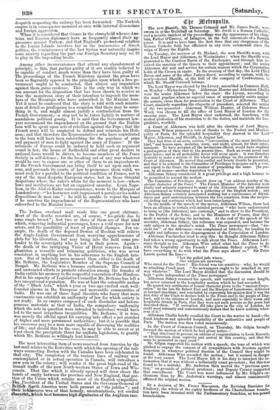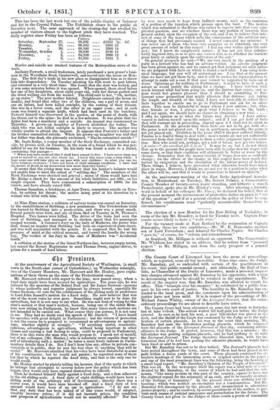'b alttrupuli5.
The new 43heriffs, M. Thomas Cotterell and Mr. James Swift, were Sworn in at' tie Guildhall on Saturday. Mr. Swift is a Roman Catholic ; and a notable incident of the proceedings was the appearance of his chap- lain, Father O'Connor, of Islington, in the full canonicals of a Rol:nth priest. It is said to have been the first time that any clergyman of the Roman Catholic faith has officiated in any civic ceremonial since the reign of Henry the Eighth.
On Tuesday, the morrow of St. Michael, the new Sheriffs went, with the Lord Mayor and Aldermen, to Westminster ; when the Sheriffs were presented to the Cursitor Baron of the Exchequer, and through him re- ceived the sanction of the Queen to their appointment ; and the senior Aldermen did suit and service for certain manors which the Corporation holds of the Crown in capite. In the evening of that day, the Lord Chief Baron and some of the other Judges dined, according to custom, with the newly-elected Sheriffs, at the hall of the company of Cordwainers, to which Mr. Sheriff Cotterell belongs.
The Lord Mayor was elected by the Livery, assembled in Common Hall, on Monday—Michaelmas Day. Alderman Hunter and Alderman Challis were the senior Aldermen below the chair : the Livery, according to the usual practice when no especial cause of unpopularity exists against the seniors, chose them for presentation to the Court of Aldermen. That Court, similarly regarding the etiquette of precedent, selected the senior of the two presented : Alderman William Hunter, of Coleman Street Ward, was chosen to fill the office of Lord Mayor of London for the ensuing year. The Lord Mayor elect undertook the functions, with modest profession of his resolution to do the duties, and maintain the hos- pitalities, worthily.
A Court of Aldermen was held after the election of Lord Mayor. Alderman Wilson proposed a vote of thanks to the Prefect and Munici- pality of Paris, for the splendid hospitality they showed to the Lord' Mayor, Aldermen, and Sheriffs, in August last.
They had fetes of all sorts, soirees, " conversation of the most intellectual kind," and houses open, morning, noon, and night, -almost, for their enter- tainment. To have accepted all the invitations offered, would have required a prolongation of their visit to the present time. Such an event never took place before, and in all probability never will occur again : it was therefore desirable to make a minute of the whole proceedings on the journals of the Court of Aldermen. He moved that cordial and hearty thanks be presented, and that it be referred to the Committee of Privileges to prepare such a vote, and report to the Court the best manner of presenting the same. [In per- son, by all means—another deputation to Paris!] Alderman Sidney considered it a great privilege and a high honour to be permitted to second the motion. The Committee of Privileges should draw up "an address worthy of the ancient character of the Court." The French Minister of the Interior most kindly and urbanely expressed to many of the Aldermen the great pleasure he experienced in witnessing such a gathering of the English nation ; and Alderman Sidney certainly anticipated nothing but a continuance of friend- liness and good understanding between the two countries, from the recipro- cal feeling and sentiment which had been interchanged. In the middle of the speech of the mover, Alderman Wilson, there had been an allusion to certain evil-minded persons "who have endeavoured to bring us [the Aldermen] into contempt," and to show to the President, to the Prefect of the Seine, and to the Ministers of France, that they made a mistake in giving the invitation. At the end of the speech of the seconder, Alderman Sidney, this reference was expanded, and became the only subject in the speaker's mind. The Tinto,* newspaper—that "an- cient foe " of the Aldermen—was complained of bitterly, for lending its weight and influence to the disparagement of the Corporation of London. Alderman Farebrother tried to stop this : he thought Alderman Sidney had taken a wrong opportunity to talk about the Times. Alderman Law- rence thought so too. Alderman Wire asked what had the Times to do with the hospitality of the French ? Alderman Sidney replied, " We have everything to do with what the Times says about us." Sir Peter Laurie quoted the lines— "Let the galled jade wince, Our withers are unwrung." Who cared for the Times ! His friend was too sensitive : why, he would be attacking Punch next. "No newspapers ought to be attacked in any way whatever." The Lord Mayor decided that the discussion should be kept "quite independent of the Times newspaper."
Alderman Sidney resumed his speech, and continued at some length, but never returned to the hospitality motion which he had seconded.
He quoted two certificates of honest character given to the " ancient Corpo- ration" by the late Sir Robert Peel and the Marquis of Lansdowne, delivered at banquet meetings ; and concluded by expressing his opinion that it was the first duty of the Court to declare both to the Times and to the people of Eng- land, and to the citizens of London, and more especially to their warm and hospitable friends in Paris, that they were not such persons as the press had described them. "If corruption did take place in the city of London, he could most solemnly and conscientiously declare that he knew nothing what- ever of it."
Alderman Challis briefly recalled the Court to the matter in hand—the frank kindness and splendid hospitality of the authorities and people of Paris. The motion was then voted unanimously.
In the Court of Common Council, on Thursday, Mr. Gilpin brought forward the motion of which he had given notice—
That this Court do present an address of congratulation to Louis Kossuth, on his liberation from captivity and arrival in this country, and that the same be presented in open court." Mr. Gilpin supported his motion with a speech, the tone of which was pitched to engage the consent of all sympathizers with freedom against
despotism in whatever political fraction of the Council they might be found. Alderman Wire seconded the motion ; but it seemed in danger at the very outset. The Lord Mayor felt it his duty to interject the in- formation that it was without a technically exact precedent ; but this was found to be a mistake. Mr. Anderton then moved the " previous ques- tion," on grounds of political prudence ; and Deputy Corney supported that amendment. The Court was more influenced by Mr. Gilpin's en- thusiasm than by Mr. Anderton'a warnings, and almost unanimously affirmed the original motion.
By a decision of Mr. Fraser Macqueen, the Revising Barrister for Finsbury, the whole of the eighty brethren of the Charterhouse founda- tion have been invested with the Parliamentary franchise, as ten-pound householders.
This has been the last week but one of the public display of Industry and Art in the Crystal Palace. The Exhibition closes to the public on Saturday next. The near approach of the closing-day has swelled the number of visitors almost to the highest pitch they have reached. The daily register since Friday has been as follows. Visitors. Receipts. Saturday, September 27, .... 20,236 £1852 2s. 6d. Monday, 68,542 3295 15 Tuesday,, 3303 14 Wednesday, Octoer 1, .... 59,050 2830 11 Thursday, „ 2, .... 64,298 3080 12 6 Friday, 31,951 3354 2 Murder and suicide are marked features of the Metropolitan news of the week.
AnthonyFawcett, a small tradesman, lately purchased a new grocer's busi- ness in the Wyndham Road, Camberwell, and moved into the house on Mon- day. The first day's trade in his new place so disappointed him as to throw him into despondency. On Tuesday morning his wife went to post letters, and returned in a very short time. She found that the door was locked, and it was some minutes before it was opened. When opened, there stood before her one of her daughters, about eight years old, with her throat gashed and the blood welling out from the wound. The child said to her, " Oh, mother, go up stairs." The poor mother fainted. Neighbours entered the house in- stantly, and found that other two of the children, one a girl of seven, and one an infant, had been killed outright, by the cutting of their throats. One was in a lower room, and the other in an upper room ; and in each room was found a separate knife, which had been used in the butchery. Fawcett himself was discovered in the garden, at the point of death, with his throat cut to the spine: he died in a few minutes. It was plain that the father had been a murderer and a suicide. An inquest was commenced on Thursday. A grown-up daughter of Fawcett identified the bodies. The child who was not killed outright is likely to recover. The mother was wholly unable to attend the inquest. It appears that Fawcett's father and his brother committed suicide. When his grown-up daughter was told that her father was dead, she piteously exclaimed, "Has he committed suicide ?"
Mr. Ingle Rudge, a young member of the Stock Exchange, committed sui- cide, by prussic acid, on Tuesday, in the room of a friend which he was per- mitted to use for his business. On his body was found a note to a friend, containing this passage- " When you have received this I shall have ceased to live. I have never done any good to myself or any one else about me. I knew this must come a long while. I hope some one will take pity on my poor wife and children : do what you can for those helpless creatures : I dare not think of their unhappy condition. I have had the means of death in my possession now more than two weeks."
It seems that the young man was aware that his banker's balance would not enable him to meet the ordeal of " settling-day." The members of the Stock Exchange were shocked and grieved ; many of them would have lent Mr. Rudge a cheek for the amount of his whole liabilities, not 300/., on his simple request. They have commenced a subscription of 10001. for his widow, and have already raised 600/.
Thomas Saunders, a bricklayer, at Agar Town, committed suicide on Tues- day, by cutting his throat ; the motive being grief at his desertion by a woman who lived with him.
At Nine Elms station, a collision of railway trains was caused on Saturday, by the unskilfulness of Stebbing, a new pointsman. The Twickenham train was turned by Stabbing into a goods-train, and there was a great smash. Several porters were hurt, and one of them died on Tuesday in St. Thomas's Hospital. Two horses were killed. The driver of the train had seen the error of Stabbing, and managed so to slacken speed that his passengers escaped wounds. A Coroner's Jury on the body of Mathews, the porter who I died, found on inquiry that Stabbing had been an experienced plate-layer, 1 and was well acquainted with the points. It is supposed that he lost his presence of mind at the critical moment, and turned the handle the wrong way. The verdict of the Jury in the case of Mathews was "Accidental death."
A collision at the station of the Great Northern line, between empty trains, has caused the Barnet Magistrates to send Thomas Owen, engine-driver, to prison for a month of hard labour.



























 Previous page
Previous page